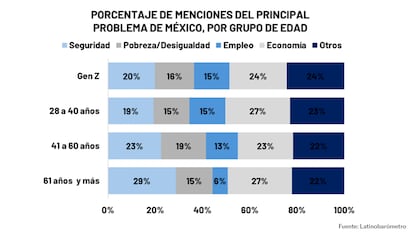Protests called by Generation Z, i.e. young people under 28, are expected to take place this Saturday in several Mexican cities.
I say presumably because, although the organizers use an iconography similar to that of Generation Z who overthrew the government of Nepal, journalistic investigations have shown that the manifesto and web domain of the “Generation Z” promoting the protests in Mexico are not organic, but rather the creation of a marketing agency linked to a former PRI deputy.
Likewise, many of the social media accounts that initially promoted the march are the same ones that previously promoted the “pink tide” and other mobilizations associated with the Mexican opposition and the PAN.
In fact, the original youth group of “Gen Z Mexico”, made up of young people, distanced itself from Saturday’s march, inviting its members not to participate because they consider it “partisan” and contrary to their ideals. The group is already promoting alternative marches with the agenda being to reduce the working day from 48 to 40 hours.
Having said the above, it cannot be ruled out that some young people actually participate in Saturday’s march in an organic way, both for their closeness to the partisan groups that organize it, and for something even more relevant: the feeling of a legitimate complaint regarding the insecurity situation that afflicts Mexico and which is the main flag of the mobilization.
This is why it becomes important to understand how distressed Mexican Generation Z is. To analyze it, I used data from the Latinobarómetro, one of the most prestigious and extensive surveys in the region.
The data is interesting.
The first and most notable thing from my analysis is that, although Generation Z has a greater distrust of the federal government (46%) than the rest of the population (53%), overall levels of distrust among young Mexicans are very low. According to data from the Latinobarómetro survey, among Generation Z in 17 Latin American countries, Mexico has the fourth lowest level of distrust in government, only behind El Salvador (33%) and Uruguay (52%).
This is not because young Mexicans tend to trust their government. In fact, in August 2018 alone, 82% of young people under 28 distrusted the federal government, with Mexico having the seventh highest level of distrust in Latin America.
What really seems to be happening in Mexico is that, very recently, young people have started to feel sympathy for the party in power. The most revealing data is that, until 2023, and with the exception of 2015, young people tended to vote more for opposition parties than for government parties. Not anymore. Once again, from the Latinobarómetro data, it is possible to see that the majority of young people (73%) declare that they intend to vote for the government coalition, although to a lesser extent than the rest of the population (74%).
Compared to other generations, Z reports greater trust in Congress (40% in Generation Z versus 31% in the rest of the population), in the judiciary (41% versus 34%) and in the electoral institution (63% versus 55%). They also report, like the rest of the generations, a very high level of trust in the armed forces (52%), which is frankly surprising among young people.
Young Mexicans of Generation Z seem satisfied. Indeed, the majority reports that in Mexico the right to political participation, gender equality and opportunities, freedom of expression and religion, and even social security are partially or fully guaranteed.
That doesn’t mean young Mexicans don’t realize there are problems. They are very clear on this point, especially regarding insecurity issues. The majority of Generation Z report feeling unprotected from crime (61%) and frequently worrying about being a victim of violence (65%).
This reflects rather a weariness towards the traditional oppositions – which is a reflection of the rejection expressed by several groups of young people towards the march called for Saturday – and a benefit of the doubt towards the government in power which is generally perceived as relatively, if not entirely, more in line with their ideological inclinations. In fact, 23% of Generation Z young people identify with the left compared to 16% who identify with the right.
There’s something more that those who called Saturday’s march may not have fully grasped: Data shows that insecurity is usually a much bigger political agenda for older generations than for younger ones. Among Generation Z, only 20% of the population identifies crime or public safety as the country’s top problem, much lower than the 29% found among people aged 61 and older.

A more interesting agenda to mobilize Mexico’s young generations would be related to economic issues and purchasing power. For example, 24% of Generation Z say Mexico’s main problem is economic hardship or rising prices. Another 15% say they have employment problems, because wages are too low, because they find unstable jobs or because there are not enough opportunities.
An agenda aimed at generating economic opportunity and decent employment could be supported by twice as many young people as insecurity.
The economic agenda corresponds to what we observe in the mobilizations actually called by young people. The groups of Generation Z, the real ones, mobilized last Saturday and expressed their desires: better jobs, better access to housing and radical change to the Mexican economic model which, rightly, they claim, has not generated sufficient well-being and social justice. These are topics that, in fact, interest them.
In short, Mexican Generation Z stands out for being less rebellious than many believe and for not having placed insecurity at the center of its political agenda. Their discontent is moderate, their trust in institutions is relatively greater than that of previous generations and their priorities are oriented towards economic, work and well-being issues. Trying to mobilize them around causes they don’t feel they own, such as traditional narratives about crime, will have a more limited effect.
Young Mexicans are not marching out of fear of criminals, but out of fear that the economic model prevents them from having a dignified quality of life. Only by being in tune with this agenda can we aspire to represent them.


